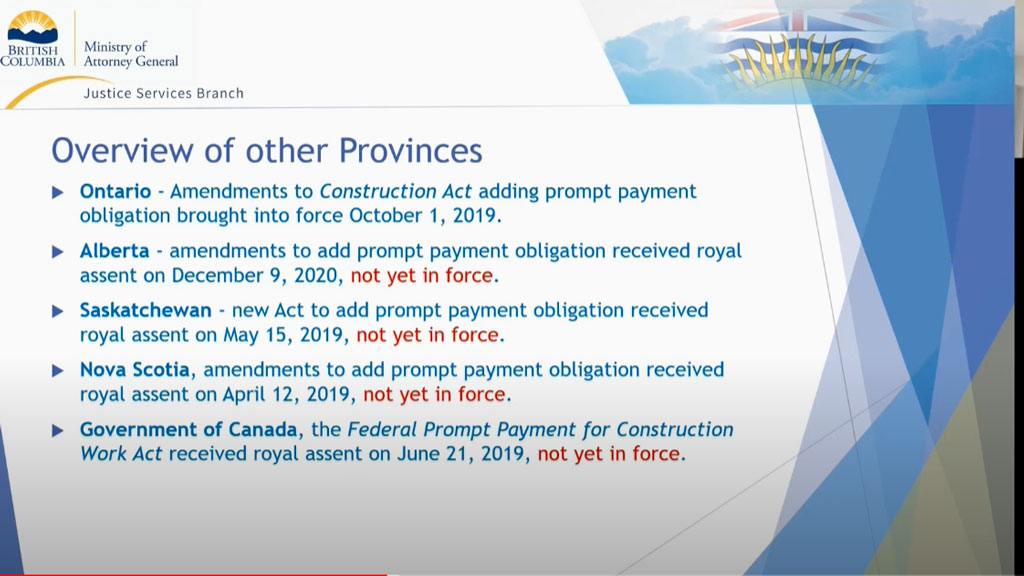B.C. construction groups are not giving up the fight to make prompt payment legislation a reality.
The Vancouver Regional Construction Association (VRCA) and the BC Construction Association (BCCA) recently hosted a series of town halls for the industry to give an update on advocacy efforts and chart a course for what work needs to be done.
Chris Atchison, BCCA president, explained during one of the town halls that he and other groups in the province have written letters, supported a private members bill, urged the BC Law Institute to address prompt payment during its lien reform efforts, had ongoing meetings with government officials, met with the premier, produced podcasts on prompt payment and even broadcast prompt payment radio ads.
Despite this, Atchison said the association has seen little visible progress.
“It seems to us that the provincial government is waiting to take an official position,” said Atchison. “Despite the advocacy efforts we still have some work to do.”.
He noted in 2014 B.C. was one of the first provinces to start consultation papers, but it now lags behind other jurisdictions. Atchison explained for legislation to happen there needs to be robust consultation, legislation drafting and regulatory development that includes an adjudication authority,
“If we started today, the legislation could be in force in 2023/2024,” said Atchison. “We need to get started.”
Town hall attendees heard from Tyler Nyvall, legal counsel in the policy and legislation division of the B.C. Office of the Attorney General.
Nyvall said the association has been successful in getting the attention of the premier and attorney general, who have been contacting him for prompt payment briefings.
“They have done a very good job of making sure this is on everyone’s radar,” said Nyvall. “There can be no principled argument with the proposition that people deserve to be paid within a reasonable amount of time after completion of their work. That is not why things are taking so long. Government recognizes there is a problem.”
Nyvall explained while there hasn’t been much visible work, there is work going on behind the scenes.
The province is analyzing Ontario’s legislation to see if it is achieving its goal of making payment faster, connecting with Public Services and Procurement Canada on being involved as an adjudication body and has joined the Regulator Reconciliation and Cooperation Table for Prompt Payment.
On the Ontario analysis, the province’s early conclusion is that it is working and people are getting paid faster.
Dan Leduc, a partner with Norton Rose Fulbright Canada LLP, told town hall attendees Ontario’s approach has been a boon to businesses. He said with more cash flow and the ability to become cash neutral, they are seeing more contractors develop their own construction companies and expand.
When addressing why the legislation was taking so long, Nyvall stressed the end goal is not legislation at all, It is getting paid promptly. He stressed he is working to ensure any action that is taken achieves this goal.
Nyvall was initially skeptical of Ontario’s legislation. Despite it looking good on paper, he wasn’t hearing a resounding roar from Ontario that it was working or seeing evidence that the dispute body was being regularly used. The answer was simple.
“The answer is that people don’t need to use it because people are getting paid promptly and that is exactly what I wanted to hear. That is the ideal answer.” he said.
Going forward, Nyvall said B.C. intends to continue exploring using a federal adjudication body as well as supporting a uniform approach to prompt payment similar to Ontario’s model rather than other jurisdictions that plan on having exemptions.
Nyvall said B.C. is positioned to move now that evidence is emerging that prompt payment legislation works and argued if B.C. produces legislation that is more popular than what is being put forward in Saskatchewan and Alberta, it could be less behind than it looks.
“If we can learn from other provinces and find ways to encourage payment and utilization of adjudication then we might leapfrog other provinces,” he said, adding the premier and the attorney general support prompt payment in principle.
“The fact that this was happening was never an issue. The only concern was whether it could be fixed with legislation.”
He strongly encouraged the industry to share its thoughts on what barriers to adjudication might be and how those barriers could be overcome.
“That is going to be gold to me,” Nyvall said. “If we have a quick, cheap and easy adjudication model that people will use if not paid promptly, then developers and general contractors will pay promptly because there would be no point in delaying the inevitable.”
Follow the author on Twitter @RussellReports.











Recent Comments